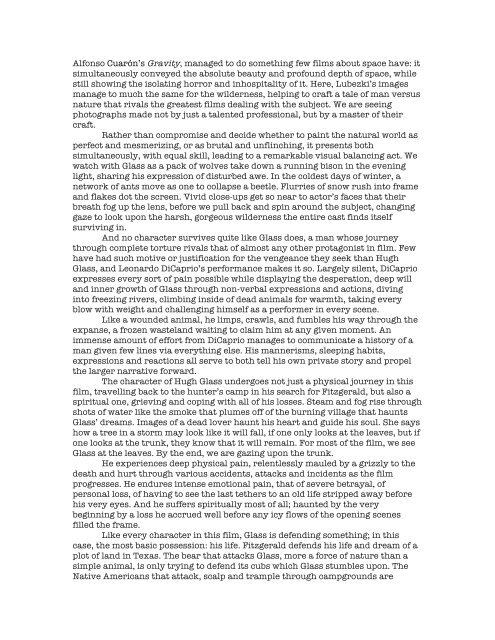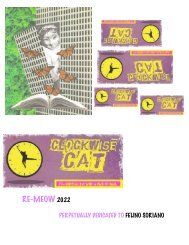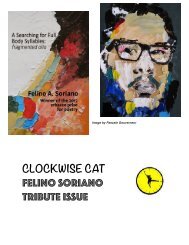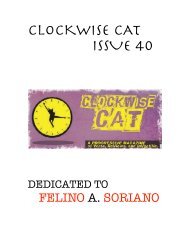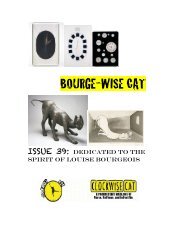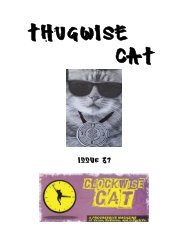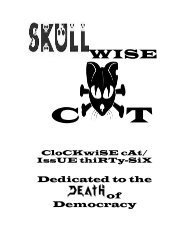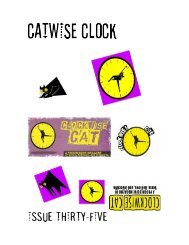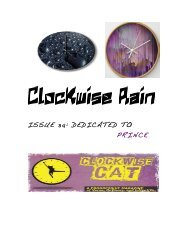StarCat/CatStar
StarCat/CatStar is dedicated to the memory of David Bowie, that cosmic subversive who’s returned at last to his ethereal home.
StarCat/CatStar is dedicated to the memory of David Bowie, that cosmic subversive who’s returned at last to his ethereal home.
You also want an ePaper? Increase the reach of your titles
YUMPU automatically turns print PDFs into web optimized ePapers that Google loves.
Alfonso Cuarón’s Gravity, managed to do something few films about space have: it<br />
simultaneously conveyed the absolute beauty and profound depth of space, while<br />
still showing the isolating horror and inhospitality of it. Here, Lubezki’s images<br />
manage to much the same for the wilderness, helping to craft a tale of man versus<br />
nature that rivals the greatest films dealing with the subject. We are seeing<br />
photographs made not by just a talented professional, but by a master of their<br />
craft.<br />
Rather than compromise and decide whether to paint the natural world as<br />
perfect and mesmerizing, or as brutal and unflinching, it presents both<br />
simultaneously, with equal skill, leading to a remarkable visual balancing act. We<br />
watch with Glass as a pack of wolves take down a running bison in the evening<br />
light, sharing his expression of disturbed awe. In the coldest days of winter, a<br />
network of ants move as one to collapse a beetle. Flurries of snow rush into frame<br />
and flakes dot the screen. Vivid close-ups get so near to actor’s faces that their<br />
breath fog up the lens, before we pull back and spin around the subject, changing<br />
gaze to look upon the harsh, gorgeous wilderness the entire cast finds itself<br />
surviving in.<br />
And no character survives quite like Glass does, a man whose journey<br />
through complete torture rivals that of almost any other protagonist in film. Few<br />
have had such motive or justification for the vengeance they seek than Hugh<br />
Glass, and Leonardo DiCaprio’s performance makes it so. Largely silent, DiCaprio<br />
expresses every sort of pain possible while displaying the desperation, deep will<br />
and inner growth of Glass through non-verbal expressions and actions, diving<br />
into freezing rivers, climbing inside of dead animals for warmth, taking every<br />
blow with weight and challenging himself as a performer in every scene.<br />
Like a wounded animal, he limps, crawls, and fumbles his way through the<br />
expanse, a frozen wasteland waiting to claim him at any given moment. An<br />
immense amount of effort from DiCaprio manages to communicate a history of a<br />
man given few lines via everything else. His mannerisms, sleeping habits,<br />
expressions and reactions all serve to both tell his own private story and propel<br />
the larger narrative forward.<br />
The character of Hugh Glass undergoes not just a physical journey in this<br />
film, travelling back to the hunter’s camp in his search for Fitzgerald, but also a<br />
spiritual one, grieving and coping with all of his losses. Steam and fog rise through<br />
shots of water like the smoke that plumes off of the burning village that haunts<br />
Glass’ dreams. Images of a dead lover haunt his heart and guide his soul. She says<br />
how a tree in a storm may look like it will fall, if one only looks at the leaves, but if<br />
one looks at the trunk, they know that it will remain. For most of the film, we see<br />
Glass at the leaves. By the end, we are gazing upon the trunk.<br />
He experiences deep physical pain, relentlessly mauled by a grizzly to the<br />
death and hurt through various accidents, attacks and incidents as the film<br />
progresses. He endures intense emotional pain, that of severe betrayal, of<br />
personal loss, of having to see the last tethers to an old life stripped away before<br />
his very eyes. And he suffers spiritually most of all; haunted by the very<br />
beginning by a loss he accrued well before any icy flows of the opening scenes<br />
filled the frame.<br />
Like every character in this film, Glass is defending something; in this<br />
case, the most basic possession: his life. Fitzgerald defends his life and dream of a<br />
plot of land in Texas. The bear that attacks Glass, more a force of nature than a<br />
simple animal, is only trying to defend its cubs which Glass stumbles upon. The<br />
Native Americans that attack, scalp and trample through campgrounds are


